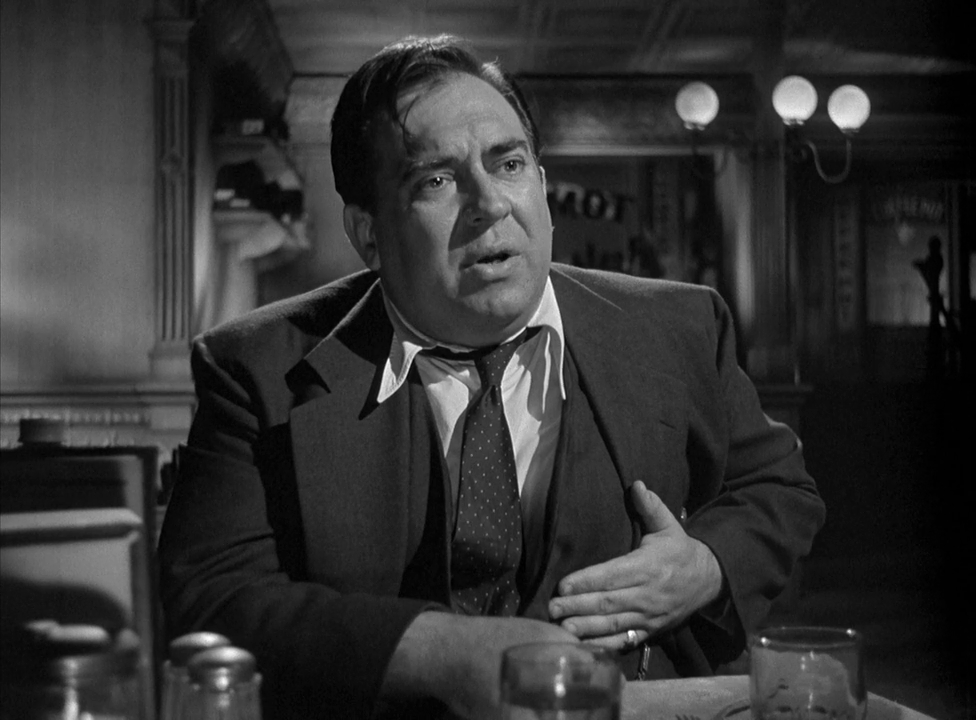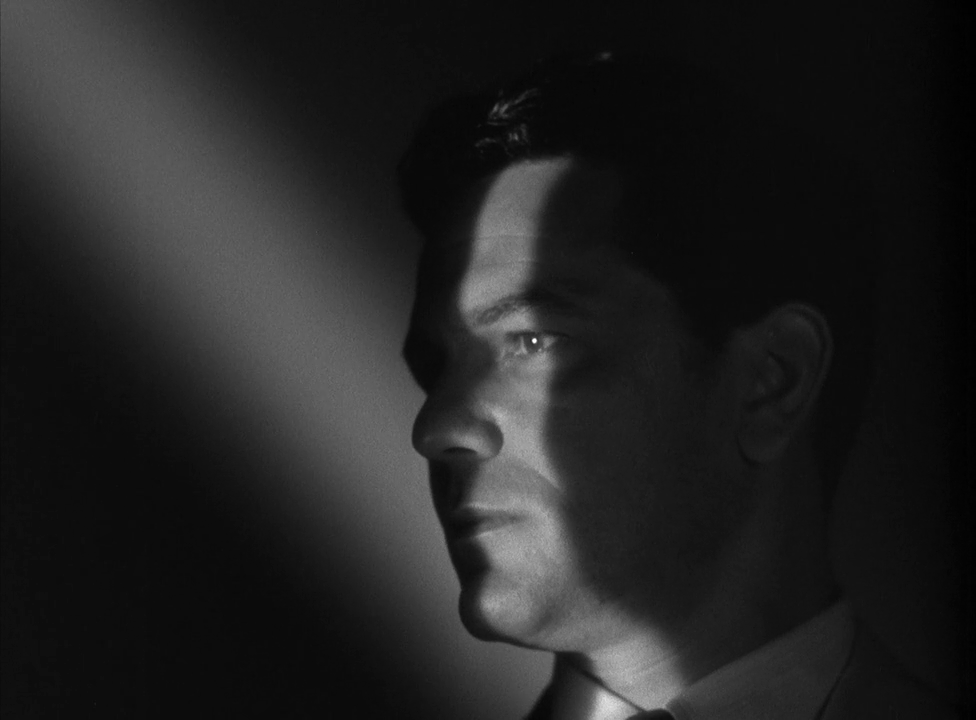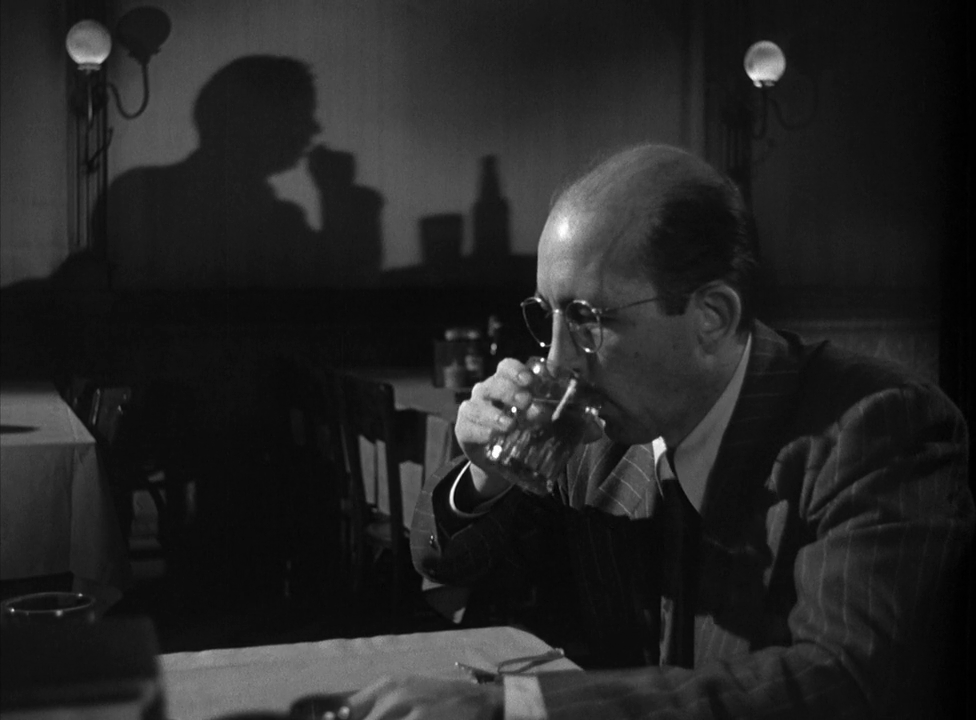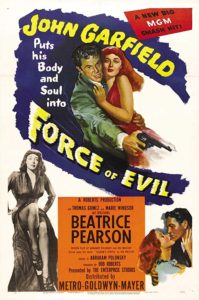|
Genres, Themes, Actors, and Directors:
- Corruption
- Gambling
- Gangsters
- John Garfield Films
- Lawyers
- Marie Windsor Films
Response to Peary’s Review:
Peary writes that in this “underground classic” — the “only film directed by Marxist screenwriter-director Abraham Polonsky prior to his blacklisting in Hollywood for being an ‘uncooperative’ witness in front of HUAC in 1951” — Polonsky “presents an ugly, cynical view… of our capitalistic, money-and-power-oriented society, where even ‘decent’ people… are so trapped and poisoned by the system that they resign themselves to making a living in crime; [and] where there is little, if any, distinction between crime and business, law enforcers and gangsters, and what is legal and illegal.” He notes that this ‘autopsy on capitalism’ “merely touches on some basic Marxist thought: characters are products of their environment; conflict results from the interaction of different classes; capitalism breeds decadence”. He writes that while the film “makes one aware of the economic shame of the cities — the rich get richer by exploiting the poor, the only jobs for the poor are in crime and involve further exploitation of their class — Polonsky shies away from making a real plea for social change or suggesting how group (class) action could change the capitalist power structure”, instead “conventionally concentrat[ing] on the individual and advanc[ing] the common Hollywood theme ‘Don’t sell out'”; he argues that “worst of all is that he would have Garfield become an informer.” He further points out the “moody” score by David Raksin and how the film is “strikingly photographed by George Barnes so that the characters seem dominated by their surroundings”, thus making this “the darkest, seediest, most claustrophobic entry in films noir.” Finally, he argues it “has the most rhythmic, believable ‘city street’ dialogue found in any Hollywood film, and a great performance by Garfield as one of his few educated characters.”
Peary discusses this film at greater length in Cult Movies book, where he notes that “just as Garfield’s boxer did at the end of the Polonsky-scripted Body and Soul (1947) when he refused to throw his fight despite what the mob might do to him”, his character here is shown as “taking a (progressive) step forward” in terms of giving “his allegiance to the law”. However, Peary refers to this as “Hogwash!” given that “throughout the film Polonsky has shown us a law that is unfeeling, a pawn of the rackets (whenever a lawbreaker wants another lawbreaker thrown in jail he simply calls the cops) and oppressive: the rackets investigation is run by a man we never see (Big Brother?) called Hall (as in City Hall), who bugs phones, raids policy banks, and throws anyone on the premises in jail whether they work there or not, and makes arrests and convictions by using a network of informers and creating an atmosphere of paranoia.” Peary expresses puzzlement about why Polonsky “disregard[s] all this in his climax”, which isn’t “horrible, but… is disappointing in that it is too pat by Hollywood standards”. Ultimately, the film shows that the longer the brothers are “part of the pervading corruption”, “constantly moving up the wobbly ladder of ‘success’, the closer they come to self-destruction.” The smartest (though not necessarily successful) individuals in the movie are those who sincerely want to get out of the corruption game altogether; and while this is shown as nearly impossible — a bespectacled informer (Howland Chamberlain) hoping to escape meets a grimly inevitable fate instead — the ending scene in which “Joe has walked back up the stairs from… purgatory to join Doris, and has been regenerated” is at least meant to provide a form of hope for the future.
Redeeming Qualities and Moments:
- John Garfield as Joe Morse (nominated as one of the Best Actors of the Year in Alternate Oscars)

- Thomas Gomez as Leo
 Noir-ish cinematography


Must See?
Yes, as a still-powerful anti-corruption flick.
Categories
Links:
|





One thought on “Force of Evil (1948)”
A once-must, for its place in cinema history. As per my post (11/11/2017) in ‘The ’40s-’50s in Film’ (fb):
“What *could* happen that I would need your help?”
‘Force of Evil’ (1948): I just rewatched this – and it put me in mind of ‘Sweet Smell of Success’. Both are unsavory tales of the ambitious underbelly of New York City (‘FOE’ deals with the numbers racket). Both have a very noir-ish feel without really being noir films. Both have very intelligent, tough-talk scripts featuring a strong bond between two leading male characters. In the supporting cast, ‘FOE’ has an unknown actress (Beatrice Pearson) who sounds like, acts like and even sort of resembles the unknown Susan Harrison in ‘SSOS’: neither one had much of a career, though Harrison continued a bit longer in television. ‘SSOS’ is the better film but ‘FOE’ has a lot of power as a gangster story (“Waddaya mean ‘gangsters’?, this is business!”) with a good number of strong sequences. If I have a reservation, it’s that – at 78 minutes – the film seems a bit rushed for something so complicated. Still, John Garfield is riveting (as usual) in the lead…and the always-interesting Marie Windsor is on board as the dame who wants him, even though she’s married to his ‘business’ partner. DP George Barnes also shot ‘Rebecca’ and ‘Spellbound’ for Hitchcock.